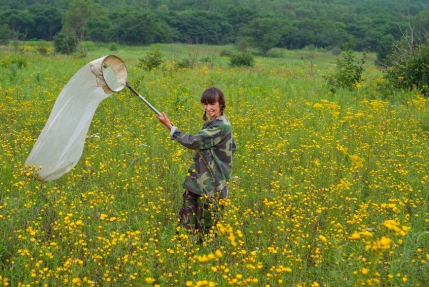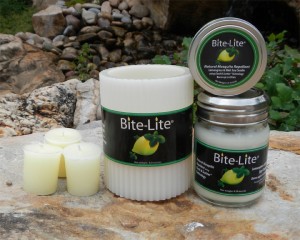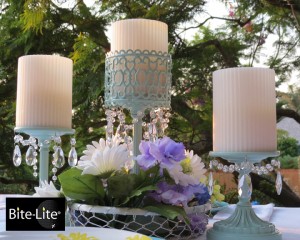Dr. Wayne Crans an entomologist from Rutgers University summarized some of these products as “gimmicks” or what he called “hoaxes that are marketed solely for economic gain.” in a data sheet that is presented on the Rutgers’ website, entitled: Products and Promotions That Have Limited Value for Mosquito Control. There are two categories of products, however, that Dr. Crans did not mention in his article. These are traps and spatial repellents, both of which have been around for decades, but have not always been available or in the consumer eye.
Mosquito surveillance traps have been used by researchers, local mosquito control districts, and the military to try to effectively estimate mosquito density as well as identify the types of mosquitoes found in specific areas. This information has been used to identify potential disease outbreaks as well as to determine when the best time to apply area wide control methods, such as mosquito sprays and larvacide. However, in the past 15 years or so, mosquito traps have been made commercially available for backyard use, with costs ranging from roughly $99 to $725. Consumer reviews of these traps are mixed. There have been numerous scientific studies proving that mosquito traps, in general, attract and collect mosquitoes. The jury is still out on how well those same traps work to ‘control’ the mosquitoes.
 Spatial repellents have also been around for a very long time– first being noted in the late 1940’s as “vapour repellents” that work ‘at a distance’. Spatial repellents are chemicals that are released into an environment to repel mosquitoes from that area. If the concentration of the chemical is at the right level, mosquitoes will be ‘discouraged’ from searching for food in that area. Dr. Dan Strickman of the USDA defines spatial repellents as, “a repellent product applied between the human and the immediate source of pests…” in his 2009 presentation about spatial repellents to the Human Subjects Review Board of the US EPA. According to Dr. Strickman, spatial repellents can be delivered either passively or actively. Passive delivery would be through natural evaporation of materials that have been either sprayed onto an area or impregnated into things like plastic strips that hang in an area.
Spatial repellents have also been around for a very long time– first being noted in the late 1940’s as “vapour repellents” that work ‘at a distance’. Spatial repellents are chemicals that are released into an environment to repel mosquitoes from that area. If the concentration of the chemical is at the right level, mosquitoes will be ‘discouraged’ from searching for food in that area. Dr. Dan Strickman of the USDA defines spatial repellents as, “a repellent product applied between the human and the immediate source of pests…” in his 2009 presentation about spatial repellents to the Human Subjects Review Board of the US EPA. According to Dr. Strickman, spatial repellents can be delivered either passively or actively. Passive delivery would be through natural evaporation of materials that have been either sprayed onto an area or impregnated into things like plastic strips that hang in an area.
The most common methods of delivering spatial repellents, at this time, are through active transmission, which is something that most of us are more familiar with: candles, torches, coils and electronic mats and more recently things like butane powered heating cells. In the past, these types of repelling systems have been lumped into a category of materials that had minimal efficacy, and while it is true that a lot of the materials that are currently found on the retail shelves are not very effective, new chemistries have been discovered and are being discovered that are improving the reputation of this category. Recently, the Gates Foundation awarded a 23 million dollar grant to a group at Notre Dame University to investigate the efficacy and feasibility of adding Spatial Repellents into the recommendations for malaria control and prevention.
 Bite-Lite® Natural Mosquito Repellent Candles contain ingredients that are relatively ‘new chemistries’ based on discoveries by research zoologist Dr. Paul Weldon with the help of organic chemists at Bedoukian Research, Inc. in Danbury, CT, while investigating the anointing behavior of capuchin monkeys. When natural essential oils were mixed in the Bite-Lite® repellent candle formulation, testing showed an 84% reduction in the number of mosquitoes
Bite-Lite® Natural Mosquito Repellent Candles contain ingredients that are relatively ‘new chemistries’ based on discoveries by research zoologist Dr. Paul Weldon with the help of organic chemists at Bedoukian Research, Inc. in Danbury, CT, while investigating the anointing behavior of capuchin monkeys. When natural essential oils were mixed in the Bite-Lite® repellent candle formulation, testing showed an 84% reduction in the number of mosquitoes
Both traps and candles have limitations, as do personal repellents, such as DEET. If not used correctly or applied correctly, they will not be as efficacious. DEET should be applied according to the label of the particular product that has been purchased. Traps should be placed between mosquito emergence sites and the area where humans will be gathered and run for long periods of time to reduce mosquito populations. Mosquito Candles should be placed near and around the area where humans will gather, and burned for a long enough period of time to allow the wax to melt and the repellents to evaporate before going outdoors. Depending on the size of the area that you are trying to protect, one device, be that candle or trap, may not be enough.



 Spatial repellents have also been around for a very long time– first being noted in the late 1940’s as “vapour repellents” that work ‘at a distance’. Spatial repellents are chemicals that are released into an environment to repel mosquitoes from that area. If the concentration of the chemical is at the right level, mosquitoes will be ‘discouraged’ from searching for food in that area. Dr. Dan Strickman of the USDA defines spatial repellents as, “a repellent product applied between the human and the immediate source of pests…” in his 2009
Spatial repellents have also been around for a very long time– first being noted in the late 1940’s as “vapour repellents” that work ‘at a distance’. Spatial repellents are chemicals that are released into an environment to repel mosquitoes from that area. If the concentration of the chemical is at the right level, mosquitoes will be ‘discouraged’ from searching for food in that area. Dr. Dan Strickman of the USDA defines spatial repellents as, “a repellent product applied between the human and the immediate source of pests…” in his 2009  Bite-Lite® Natural Mosquito Repellent Candles contain ingredients that are relatively ‘new chemistries’ based on discoveries by research zoologist
Bite-Lite® Natural Mosquito Repellent Candles contain ingredients that are relatively ‘new chemistries’ based on discoveries by research zoologist 
 While observing monkeys at the Jungle Friends Primate Sanctuary in Florida, a research zoologist noted that monkeys, when presented with lemons or limes, will immediately rub the fruit on their fur, presumably to repel biting insects. Bite-Lite’s scientists further studied this phenomenon called “anointing” behavior and determined that these citrus materials represented a potential source of new mosquito repellents.
While observing monkeys at the Jungle Friends Primate Sanctuary in Florida, a research zoologist noted that monkeys, when presented with lemons or limes, will immediately rub the fruit on their fur, presumably to repel biting insects. Bite-Lite’s scientists further studied this phenomenon called “anointing” behavior and determined that these citrus materials represented a potential source of new mosquito repellents. Dress up your Bite-Lite® Natural Mosquito Repellent Candles for an elegant look when dining outdoors
Dress up your Bite-Lite® Natural Mosquito Repellent Candles for an elegant look when dining outdoors